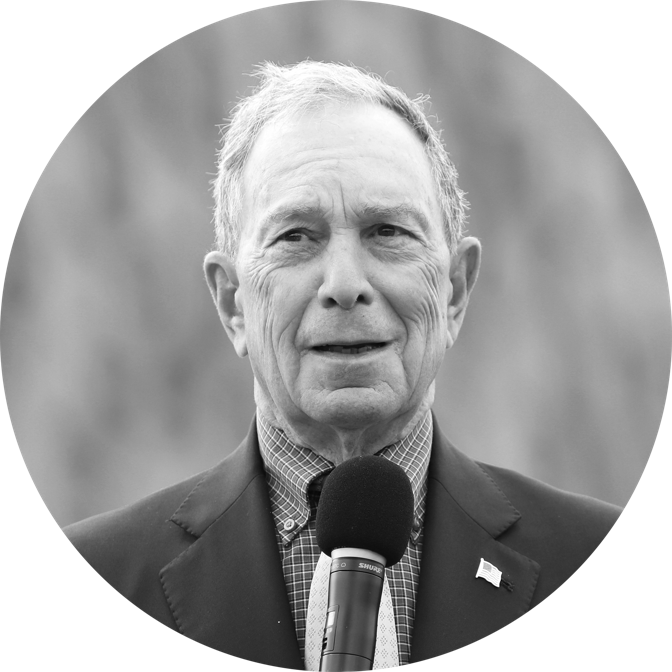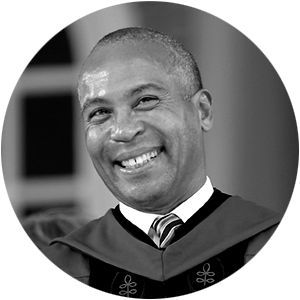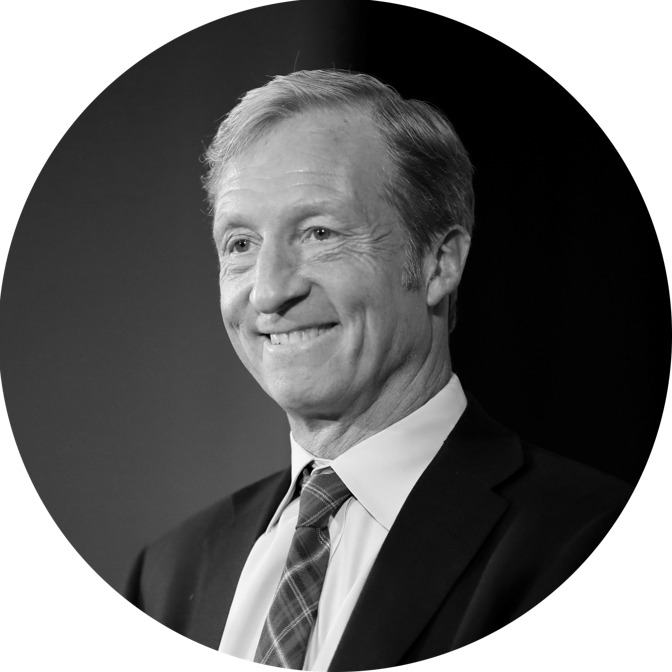In the Christian calendar, Advent is the time of keeping watch, awaiting the arrival of the Messiah. So, too, it is proving the time to keep watch in the Democratic presidential primary—as the field reshuffles and the Iowa caucus and New Hampshire primary draw nigh.
In Matthew’s Gospel, Jesus exhorts his followers to vigilance: “Understand this: If the owner of the house had known in what part of the night the thief was coming, he would have stayed awake and would not have let his house be broken into.” But like Peter in Gethsemane, your cheat sheeter dozed off, taking two weeks for paternity leave just as a flurry of activity struck the presidential campaign. Whoops!
So to catch up: Since we last spoke, Michael Bloomberg and his substantial coffers entered the bid for the Democratic nomination, hot on Deval Patrick’s heels. Meanwhile, three Democrats left the race. The most consequential and notable of these is Kamala Harris, the senator from California—the most significant candidate so far to end her campaign this cycle, though she won’t be the last.
During her quick ascent from California attorney general to powerful Washington, D.C., figure, Harris was hailed as an Obamaesque politician. She won praise for her prosecutorial skill in Senate hearings, and started her campaign with a massive rally in Oakland. And that wasn’t even the high point of her bid. That came in a June Democratic debate, when Harris knocked the former vice president, and current front-runner, Joe Biden on his heels during an exchange about busing and school integration. She was soon polling near the top of the pack.
But the aftermath of that moment hinted at why Harris’s campaign is now history. Having hammered Biden, she struggled to articulate what her actual position was and how it was materially different from his. The vagueness of her stances in general, but especially on health care, proved to be a weakness. So did her record as a prosecutor—once a feather in her cap, but a vulnerability with activists who dominate the Democratic primary. Her campaign was also a chaotic mess, according to a recent New York Times report. With the writing on the wall, Harris left the race rather than dragging out the inevitable, perhaps a wise maneuver.
The two other departures from the race might be described as “expected,” but that would suggest that someone was paying attention to either candidate. Montana Governor Steve Bullock staked his campaign on being an executive who won in a Donald Trump–voting state, but he proved more alluring on paper and to pundits than to actual voters. Also out is Joe Sestak, the Steve Bullock of the He-also-ran? tier of the race. Unlike Bullock, the retired admiral and U.S. representative didn’t even earn pious, handwringing centrist laments in his late-announced, early-ending bid.
These exits leave the field at a still-unwieldy 17 candidates. Not that all of those candidates are created equal. Only six—Biden, Pete Buttigieg, Amy Klobuchar, Bernie Sanders, Tom Steyer, and Elizabeth Warren—have qualified for the next Democratic debate, on December 19, with two more (Tulsi Gabbard and Andrew Yang) close.
Within the other nine, there are three tiers. First, there are Cory Booker and Julián Castro, prominent national politicians who once seemed to have potential as candidates but who have struggled to gain much purchase in polls. Then, there’s a group of candidates who may have much to speak for them but who have never looked like serious contenders, for various reasons: Michael Bennet, John Delaney, Marianne Williamson, and the newcomer Deval Patrick.
Finally, in a category of his own (as he would surely want it) is Michael Bloomberg. No one seems to know what sort of candidate he is. Bloomberg has the cash to stay in the race as long as he wishes, but by rejecting donations, he guarantees that he can’t make the debate stage. Meanwhile, he has begun his campaign with rhetoric that seems more similar to 2012-era Mitt Romney, in both substance and tone deafness, than to other Democrats. Steyer shows that money can buy one’s way onto a debate stage, but that it can’t buy real traction.
Bloomberg’s strategy is reportedly to wait out the first few states, hope for his rivals to leave a mess and wear themselves out, and then pick up the pieces. This isn’t the first time a candidate has tried this—it’s not even the first time a former New York City mayor has tried it—and it didn’t work out so well for Rudy Giuliani in 2008. (And look where he is now!) But it is true that the race still seems wide open. Biden remains atop the field, but he still can’t shake his challengers, and he remains dogged by gaffes. Bernie Sanders remains Bernie Sanders—popular with his crowd, but neither rising nor falling much. Elizabeth Warren has faded somewhat, and Pete Buttigieg has risen, but both remain in the hunt. (Steyer and Klobuchar may be on the debate stage, but their hopes are faint.)
In short, plenty of surprises could still be in store. Keep watch!
As the primaries progress, this cheat sheet will be updated regularly.
The Democrats
MICHAEL BLOOMBERG
Who is he?
The billionaire former mayor of New York, Bloomberg is a Democrat turned Republican turned independent turned Democrat again.
Is he running?
Yes. Having ruled out a run in March, hizzoner changed his mind in early November and officially launched his campaign on November 24.
Why does he want to run?
For starters, he is convinced that he’d be better and more competent at the job than anyone else. Bloomberg’s bid will likely center on his pet issues of gun control, climate change, and fighting the more fiscally liberal wing of the Democratic Party tooth and silver-plated nail.
Who wants him to run?
What, is his considerable ego not enough? Though his tenure as mayor is generally well regarded, it’s unclear what Bloomberg’s Democratic constituency is beyond other wealthy, socially liberal and fiscally conservative types, and it’s not as if he needs their money to run.
Can he win the nomination?
Probably not. Bloomberg previously toyed with an independent run, but said that would only help Trump in 2020.
DEVAL PATRICK
Who is he?
Patrick was governor of Massachusetts from 2007 to 2015, after serving in a top role in Bill Clinton’s Justice Department. More recently, he’s worked at Bain Capital.
Is he running?
Yes. Patrick officially entered the race on November 14.
Why does he want to run?
To be president, of course. But having passed on a run earlier, Patrick reconsidered because of worries that no one in the Democratic field has strong momentum and can unite the party.
Who wants him to run?
There’s an appetite for new candidates among some in the Democratic donor class, though there’s little sign that voters are so eager. Patrick is close to Barack Obama, but the former president has stayed out of the primary.
Can he win?
We’re not saying that a former Massachusetts governor and Bain employee can’t win the presidency, but recent history isn’t encouraging. But take it from Patrick: “I recognize running for president is a Hail Mary under any circumstances. This is a Hail Mary from two stadiums over.”
What else do we know?
Patrick’s estranged father played in the alien jazz great Sun Ra’s Arkestra.
TOM STEYER
Who is he?
A retired California hedge-funder, Steyer has poured his fortune into political advocacy on climate change and flirted with running for office.
Is he running?No. He announced on January 9 that he would sit the race out. Lol jk! Steyer decided to get back into the race on July 9 after all.
Why does he want to run?
Impeachment, baby.
Who wants him to run?
There must be some #Resistance faction out there that does.
Can he win the nomination?
Nope.
MICHAEL BENNET
Who is he?
The Coloradan was appointed to the Senate in 2009 and has since won reelection twice.
Is he running?
Yes. Bennet announced his campaign on May 2.
Why does he want to run?
Like his fellow Rocky Mountain State Democrat John Hickenlooper, Bennet presents himself as someone with experience in business and management who knows how to work with Republicans.
Who wants him to run?
Probably some of the same people who wanted Hickenlooper to run. Bennet gained new fans with a viral video of his impassioned rant about Ted Cruz during the January government shutdown.
Can he win?
No.
Source link
 Black America Breaking News for the African American Community
Black America Breaking News for the African American Community



